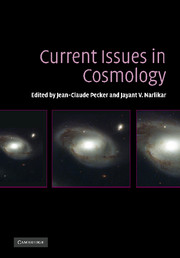Book contents
- Frontmatter
- Contents
- List of contributors
- Preface
- Part I Observational facts relating to discrete sources
- 1 The state of cosmology
- 2 The redshifts of galaxies and QSOs
- 3 Accretion discs in quasars?
- Part II Observational facts relating to background radiation
- Part III Standard cosmology
- Part IV Large-scale structure
- Part V Alternative cosmologies
- Part VI Evidence for anomalous redshifts
- Part VII Panel discussion
- Index
1 - The state of cosmology
Published online by Cambridge University Press: 15 December 2009
- Frontmatter
- Contents
- List of contributors
- Preface
- Part I Observational facts relating to discrete sources
- 1 The state of cosmology
- 2 The redshifts of galaxies and QSOs
- 3 Accretion discs in quasars?
- Part II Observational facts relating to background radiation
- Part III Standard cosmology
- Part IV Large-scale structure
- Part V Alternative cosmologies
- Part VI Evidence for anomalous redshifts
- Part VII Panel discussion
- Index
Summary
In introducing the general topic of this meeting I am going to give a personal view. Only late in my professional career (∼1990) did I begin to work seriously in cosmology, though I had always followed with interest the various claims that progress was being made, and I even wrote a review of the state of affairs for Nature in 1971 entitled, “Was There Really a Big Bang?” (Burbidge 1971).
Introduction
For some years this period, starting in the 1990s, has been said to be the golden age of cosmology. Compared with the situation earlier, this is a fair judgement, since in the last decade or more there has been a tremendous increase in the number of people working in the field, and large sums of money have been invested in new methods of observation of the background radiation and of large numbers of galaxies and other discrete objects, often those with high redshifts. Another important ingredient is the renewed interest in cosmology taken by many theoretical physicists and experimental particle physicists.
With this expansion has come a great deal of new information, and a model for the Universe that almost everyone believes in. This in turn means that while there are many conferences on cosmology, the theme is almost always the same. This meeting will be different because some of its organizers have for a variety of reasons not followed the main stream. At the same time I hope that there will be a fair discussion of the conventional cosmological model.
- Type
- Chapter
- Information
- Current Issues in Cosmology , pp. 3 - 16Publisher: Cambridge University PressPrint publication year: 2006
- 2
- Cited by



